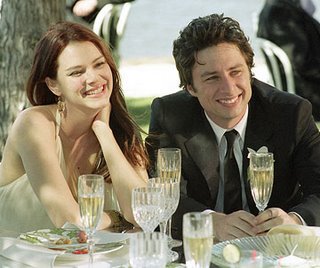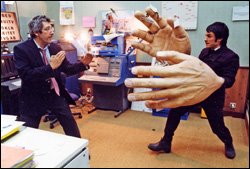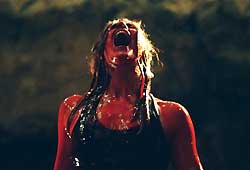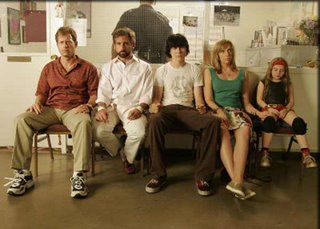 The Last Kiss
The Last KissStarring: Zach Braff, Jacinda Barrett, Rachel Bilson, Casey Affleck
Written by: Paul Haggis
Directed by: Tony Goldwyn
Official Website
Photo courtesy of Yahoo
Why is it always the man who has commitment issues?
Why does the woman always become an emotional shrew in the face of any perceived infidelity?
And why, God why, is stalker-logic (like breaking down the doors of your ex-girlfriends house, or sitting on her porch for three nights straight) considered heart-breakingly romantic?
These are just a few of the questions that plagued me throughout The Last Kiss, starring Zach Braff. Braff has been considered especially brave to play an adorable cad who loves his pregnant girlfriend (Jacinda Barrett,) but is "scared" and assuages his fears by having it off with a slutty yet naive co-ed (The OC's Rachel Bilson.) And as much as I do love Braff and his puppy-eyed vulnerability, I could not get myself into this movie. It's a cliched film in an "edgy" film's clothing; 30-year-old men are already having their mid-life crises, their eyes going all wide and fearful at the mention of marriage or buying a house. The wise old married man offers the sage advice of "Never give up hope"... even when you reasonably should. People wail and bemoan their love lives and failing marriages while Death Cab for Cutie plays gently in the background. Braff, as well as writer Paul Haggis (of Crash and Million Dollar Baby fame) and director Tony Goldwyn have been dutifully flogging their movie as "real," and "honest." But if cliches weren't true to life, they wouldn't be cliches. Their hast to be a middle ground where something "real" can be blended with something original... something like Garden State, maybe.
But the most tragic bit in this turn of events is Braff's seemingly unstoppable descent into Woody Allen-like self-absorption. It's suddenly all about Zach Braff and his music and his adorable nose. His major quandary in Last Kiss is "Hmmm, should I marry my hot girlfriend or leave her for the hot college student?" And his character is so stale and generic it becomes unclear why either woman would really want him. An adorable nose only gets you so far in life, and while Woody Allen had inexorable talent to back up his ego (at least in his heyday,) Braff's range is far more limited. And that's coming from a fan.
The film is however backed up by a decent supporting cast, including the deft Blythe Danner and Tom Wilkinson as Barrett's parents going through marital troubles. Casey Affleck is also striking as the buddy who's marriage is falling apart in the face of new parenthood, in a performance that's that's both subtle and memorable. But the biggest surprise is Bilson. I despised her on The OC and never thought much of her acting ability or emotional depth. But Bilson takes her slutty college girl beyond the stereotypes and really fleshes out a character that could have faded into the background. But even a good set of supporting roles can't save the film's inherent lack of originality. The movie plods along, helped admittedly by a fantastic soundtrack (I think Braff probably just attached his Ipod to the sound editing machine and let it roll.) And Braff and Barrett become so mind-numbingly dull after a while you don't even care if they get back together or not. I never thought a pregnant woman screaming hysterically at her cheating man could be boring, but there you go.
One of the most telling moments in Last Kiss is Danner's conversation about the nature of marriage. She tells her daughter "You think you know what goes into a 30-year marriage, but you don't have a clue. You don't have a clue." Besides being an astonishingly genuine moment of truth, it also says outright what The Last Kiss has demonstrated. The nature of relationships are mysterious, hard to quantify and nearly impossible to render artistically without seeming generic and 2-dimensional. This attempt to do it here was a valiant one. But, for the most part, Hollywood just doesn't have a clue.



